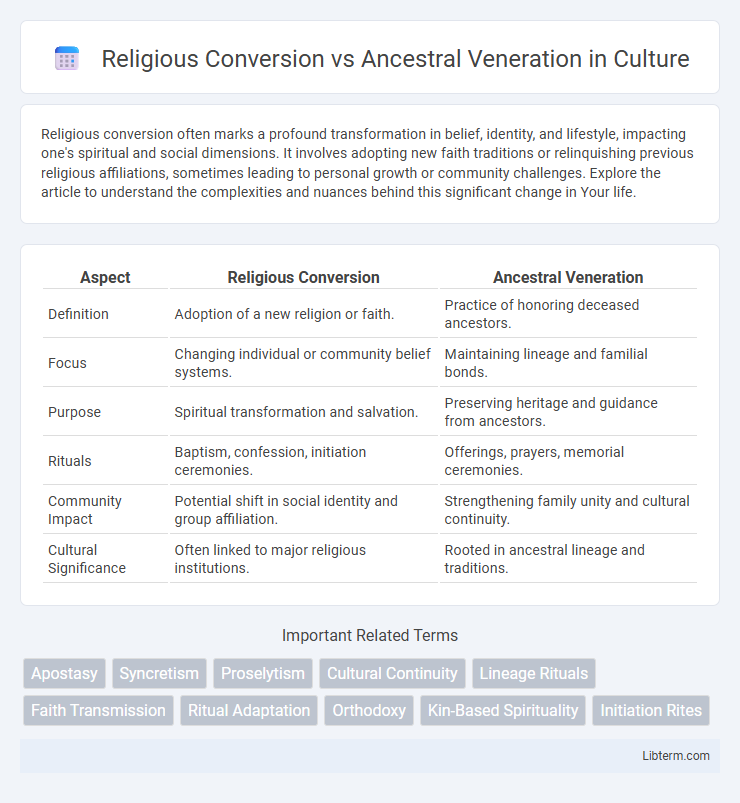Religious conversion often marks a profound transformation in belief, identity, and lifestyle, impacting one's spiritual and social dimensions. It involves adopting new faith traditions or relinquishing previous religious affiliations, sometimes leading to personal growth or community challenges. Explore the article to understand the complexities and nuances behind this significant change in Your life.
Table of Comparison
| Aspect | Religious Conversion | Ancestral Veneration |
|---|---|---|
| Definition | Adoption of a new religion or faith. | Practice of honoring deceased ancestors. |
| Focus | Changing individual or community belief systems. | Maintaining lineage and familial bonds. |
| Purpose | Spiritual transformation and salvation. | Preserving heritage and guidance from ancestors. |
| Rituals | Baptism, confession, initiation ceremonies. | Offerings, prayers, memorial ceremonies. |
| Community Impact | Potential shift in social identity and group affiliation. | Strengthening family unity and cultural continuity. |
| Cultural Significance | Often linked to major religious institutions. | Rooted in ancestral lineage and traditions. |
Introduction to Religious Conversion and Ancestral Veneration
Religious conversion involves adopting a new faith system, often characterized by a transformative change in beliefs, practices, and identity, while ancestral veneration centers on honoring and maintaining rituals connected to forebears within established cultural traditions. Conversion typically signifies a conscious decision to embrace doctrines that may conflict with previous religious identities, whereas ancestral veneration emphasizes continuity, respect, and communal memory preservation. Understanding these distinctions highlights how religious conversion disrupts established beliefs, contrasting with the integrative and heritage-focused nature of ancestral veneration.
Defining Religious Conversion: Concepts and Contexts
Religious conversion involves a profound transformation in an individual's belief system, often marked by adopting a new faith or spiritual identity that redefines their worldview and practices. This shift can occur in diverse contexts, such as personal revelation, social influence, or cultural exchange, and is frequently accompanied by rituals or formal declarations. Unlike ancestral veneration, which centers on maintaining continuity with familial and cultural heritage through honoring forebears, religious conversion signifies a break or realignment of spiritual allegiance.
Understanding Ancestral Veneration: Beliefs and Practices
Ancestral veneration involves honoring deceased ancestors through rituals, offerings, and ceremonies, reflecting deep respect for familial lineage and spiritual guidance. This practice is rooted in the belief that ancestors influence the living by providing protection, wisdom, and blessings. Understanding ancestral veneration requires recognizing its cultural significance across societies, where it maintains social cohesion and connects present generations with their heritage.
Historical Perspectives: Evolution of Both Traditions
Historical perspectives reveal that religious conversion often emerged from socio-political shifts and colonial expansions, transforming individual and communal identities through imposed or voluntary adoption of new faiths. Ancestral veneration predates many major religions, serving as a foundational cultural practice that reinforces lineage, memory, and social cohesion in various indigenous and traditional societies. Over time, the interplay between religious conversion and ancestral veneration has led to syncretic practices, where elements of ancestral worship are integrated into adopted religions, reflecting evolving spiritual landscapes.
Motivations Behind Religious Conversion
Motivations behind religious conversion often involve a search for personal spiritual fulfillment, social integration, or alignment with new moral values, contrasting with ancestral veneration's emphasis on maintaining continuity with family traditions and honoring lineage. Converts may seek community acceptance, psychological relief, or ideological clarity, while ancestral veneration focuses on preserving identity and cultural heritage through rituals that connect present generations with their ancestors. Understanding these motivations highlights the dynamic interplay between individual agency in religious change and collective responsibility in ancestral worship.
Cultural Significance of Ancestral Veneration
Ancestral veneration holds deep cultural significance, embodying respect for lineage and continuity within communities. It reinforces social cohesion by maintaining rituals that honor forebears, preserving historical identity and collective memory. Unlike religious conversion, ancestral veneration sustains indigenous belief systems and traditional practices integral to cultural heritage.
Key Differences in Rituals and Worship
Religious conversion often involves formal rituals such as baptism, confirmation, or initiation ceremonies that signify a deliberate change of faith, while ancestral veneration centers on honoring deceased family members through offerings, prayers, and maintaining ancestral altars. Worship in religious conversion typically includes adherence to established dogmas, participation in communal services, and following sacred texts, whereas ancestral veneration emphasizes personal, familial rituals and ongoing respect for lineage without altering core religious beliefs. The key distinction lies in conversion prompting a shift in spiritual identity, contrasted with ancestral veneration's focus on continuity and reverence within a given cultural or religious framework.
Social Implications: Identity and Community
Religious conversion often reshapes individual identity by introducing new belief systems and community affiliations, creating both opportunities for social integration and challenges of acceptance within original familial or cultural groups. Ancestral veneration reinforces collective identity through shared rituals and lineage, fostering strong community bonds rooted in tradition and historical continuity. The social implications of these practices influence intergenerational relationships, community cohesion, and the negotiation of cultural heritage in multicultural environments.
Challenges and Controversies in Modern Societies
Religious conversion often faces challenges related to identity conflicts and social alienation, as individuals navigate shifting beliefs that may clash with entrenched ancestral veneration practices deeply rooted in cultural heritage. Controversies arise when conversion is perceived as a rejection of ancestral traditions, leading to communal tensions and debates over religious freedom versus cultural preservation. Modern societies grapple with balancing respect for individual spiritual choices against the collective desire to maintain ancestral veneration as a cornerstone of cultural identity.
Conclusion: Intersections and Future Dynamics
Religious conversion often challenges ancestral veneration by introducing new belief systems that may conflict with traditional rituals and practices. However, both phenomena intersect through the fluid negotiation of identity, as converts may selectively integrate ancestral elements to maintain cultural continuity. Future dynamics will likely see increasing syncretism, influenced by globalization and digital communication, fostering hybrid spiritual expressions that honor both conversion experiences and ancestral heritage.
Religious Conversion Infographic

 libterm.com
libterm.com